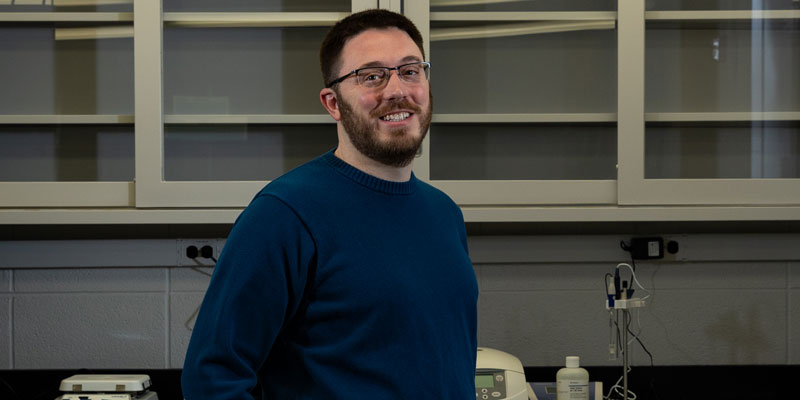New faculty member Thomas Niehaus investigates how metabolic processes go awry—and how biologists can conquer the chaos.

Metabolism is a messy process. As basic chemical building blocks are converted into complex organic material, there’s a lot that can go wrong—so much so that organisms have systems in place specifically to fix damaged metabolites -before they cause too much harm.
To Thomas Niehaus, these repair systems aren’t just scientifically fascinating, but a crucial tool for advancing synthetic biology. Niehaus started as assistant professor in the College of Biological Sciences’ Department of Plant and Microbial Biology in December. In his new role, he aims to explore the nascent field of metabolite repair and how these mechanisms could help scientists engineer new traits in microbes and plants while eliminating potentially harmful side effects.
Attempts to develop new metabolic pathways have often failed in the past, Niehaus says, because they ignore the problem of metabolite damage and repair.
“It’s all about discovering where metabolism goes wrong, and figuring out ways to fix it,” he says. “I think this research area is starting to be more widely accepted, but it’s still in its infancy. A lot of those systems out there are left to be understood.”
Niehaus developed an interest in science and plants from an early age, influenced by his mother, a science teacher, and his father, a pharmacist. His curiosity led him to study agricultural biotechnology at the University of Kentucky, where he remained for graduate school.
It was during his Ph.D. project that Niehaus started to explore metabolic engineering. His focus was on an oil-producing green algae called Botryococcus, thought to be a promising source of renewable biofuel if only it were faster and easier to grow. Niehaus pinpointed the metabolic pathway in the algae that produces the oil, and then put the genes responsible for that pathway into yeast to see if the faster-growing organisms would produce the same oil more quickly.
While the yeast did produce some oil, the new pathway also poisoned them. The culprit, Niehaus realized, was the lack of damage control—an intermediate step in the process produced toxins, and there was no repair system to remove them.
Now, as part of CBS, Niehaus is broadening his focus to discover metabolite damage-control systems in plants and algae, with plans to delve into potential applications in metabolic engineering or crop improvement. Metabolic repair systems could play an important role, he says, in helping plants better withstand high heat, droughts, and other harsh conditions likely to accompany a changing climate. Such research could also be the first step toward new medical treatments, as failure to repair metabolite damage plays a role in some human diseases and even contributes to the aging process.
As Niehaus settles in to his new office, orders equipment for his lab, and acclimates to his first Minnesota winter, he looks forward to beginning his research and collaborating with fellow CBS faculty. He anticipates the new possibilities in synthetic biology that may come through metabolite repair.
“We will start by ‘borrowing’ metabolic fixes from other organisms,” he said, “but it’s the hopes and dreams of synthetic biology to one day create them from scratch.”
-Kevin Coss